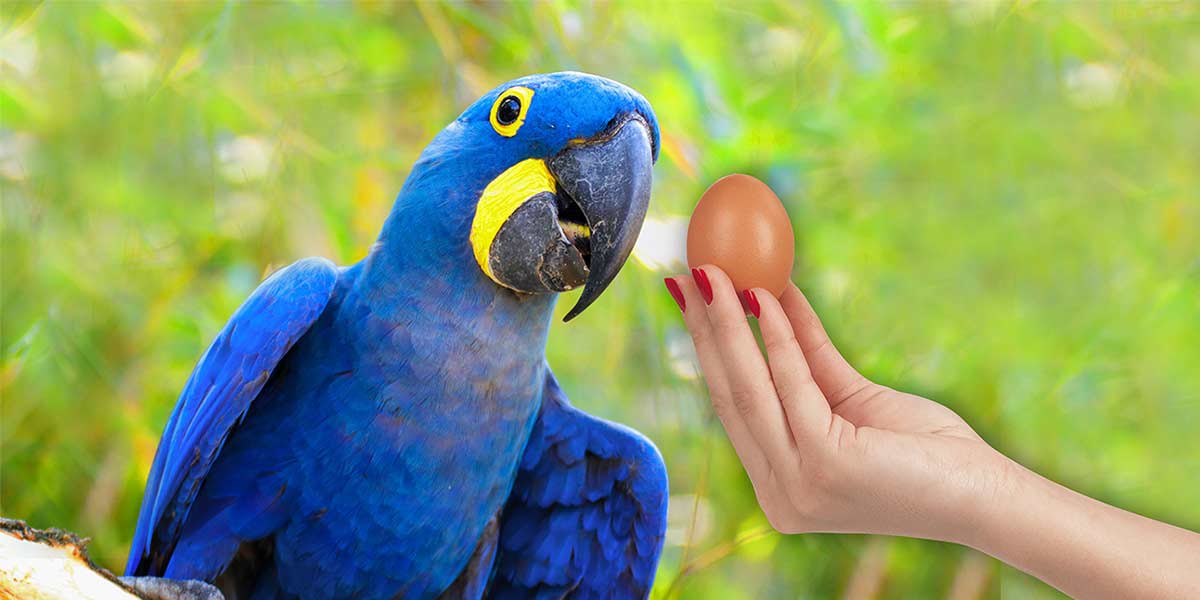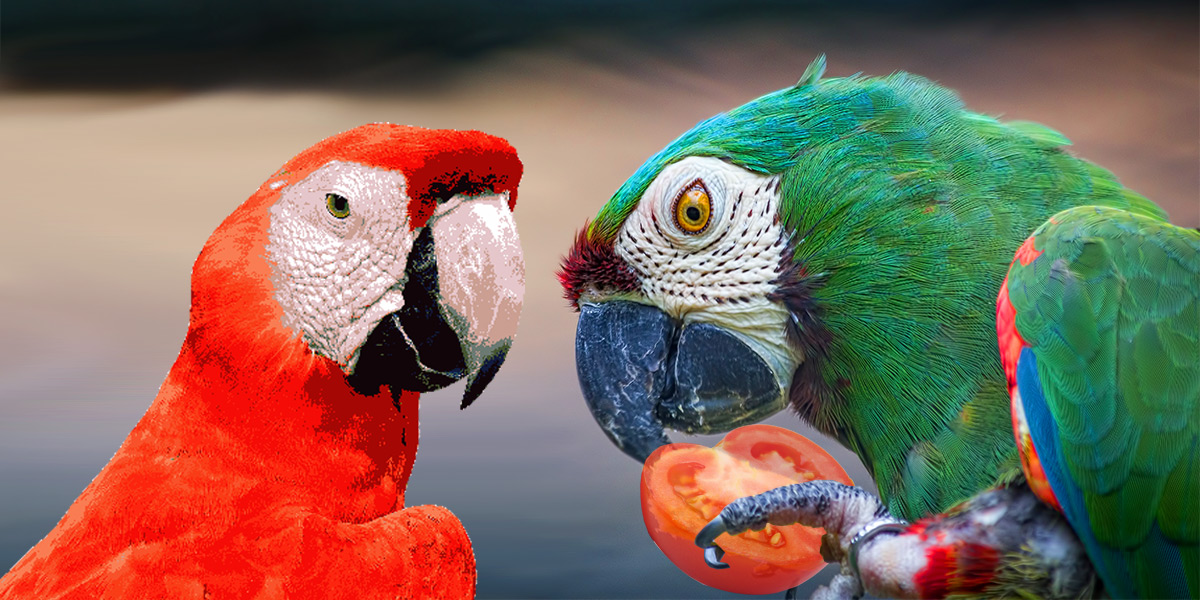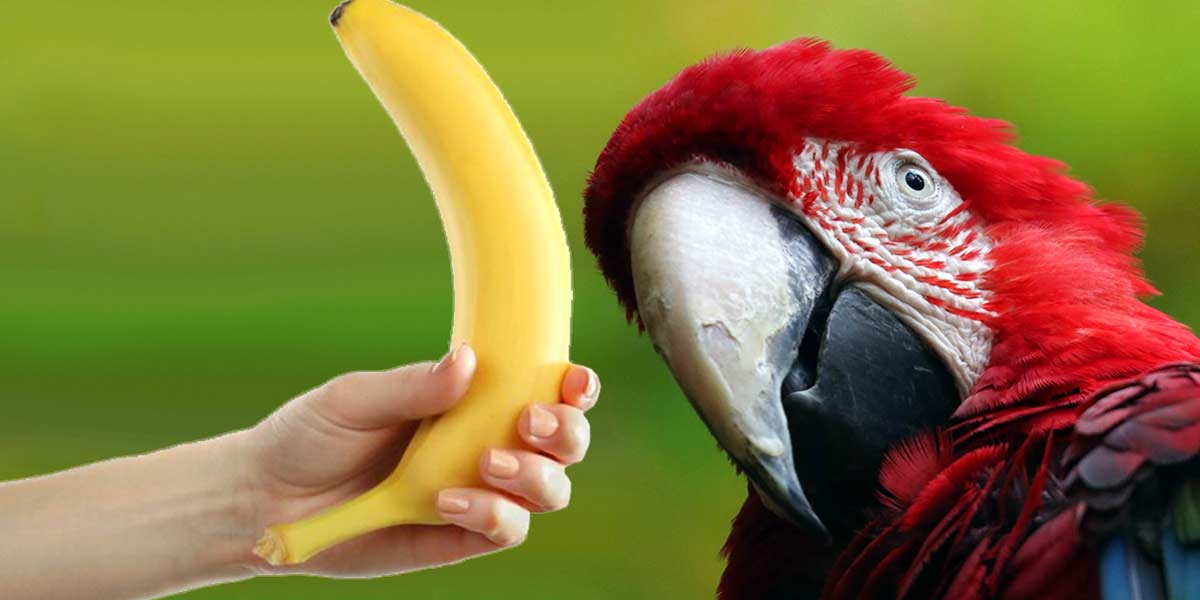While parrots are intelligent animals, they are still prey animals. This means that, in the wild, they eat seeds, fruits, nuts, insects, and eggs if found. So, you may be wondering, can I feed my parrot eggs? The short answer is yes. Eggs are OK to feed your parrot, but only in moderation.
As an affiliate, we earn from qualifying purchases. We get commissions for purchases made through links in this website’s posts from Amazon and other third parties.
In this blog post, we’ll explore why eggs are suitable for your parrot and offer tips on feeding them a healthy diet with eggs.
Learn how good is feeding your parrot eggs for its health and how it can supplement its diet
Parrots often have a hard time finding the necessary nutrients to keep healthy. Therefore, you must invest in a good parrot food that contains all the nutrients they need. These foods often include the nutrients you need to prevent your parrot from getting sick.
If your parrot doesn’t eat all of its food, food particles get caught in the windpipe, which can cause choking. To prevent this, you can feed your parrot eggs. Not only can eggs be an excellent source of protein, but they are also easy to digest.
The nutrients in eggs help to keep your parrot healthy, but they can also help to prevent your pet from getting sick. Just like in bird food, there are nutrients in eggs that protect birds from disease and infection. Furthermore, because eggs are rich in calcium, they encourage bone growth and keep your parrot’s beak in top condition.
What are the potential benefits of eggs for your parrot’s health?
Eggs are one of the healthiest foods you can give your parrot. They contain a variety of vitamins, minerals, and nutrients that ensure your parrot’s good health. In addition, eggs contain essential amino acids, which give parrots the energy they need to live long and happy lives.
Eggs contain carotene, which is necessary for good eyesight. This nutrient is also in carrots. Vitamin D in eggs helps the body absorb calcium, which is essential for strong bones and teeth. In addition, eggs contain omega 3 and omega 6 fatty acids, which your body needs for normal growth and development.
Additionally, egg whites provide minerals such as magnesium, and zinc.
Eggs provide also your parrot with vitamins and nutrients, such as Vitamin A, Vitamin B12, and riboflavin (Vitamin B2).
Eggs contain lecithin, an unsaturated fatty acid that is beneficial for the immune system. Lecithin also improves brain development in young parrots.
Eggs also contain lutein and zeaxanthin, which help to protect the eyes from sun exposure. Studies have shown that the lutein in eggs can protect against macular degeneration and cataracts.
The nutrients in eggs help your parrot thrive and live long and happy lives.
Understand the potential risks associated with feeding your parrot eggs and how to prevent them
Most parrots are omnivores so they will benefit from having eggs in their diets. While eggs can provide essential nutrients, there are potential risks when feeding eggs to a parrot.
1. Bacteria and diseases
Some eggs, particularly those from chickens that are roaming free, can contain bacteria and diseases. If you choose your eggs carefully, you shouldn’t have a problem, but always check the package to make sure that there are no signs of disease in the eggs.
2. Cholesterol risk
In addition to bacteria, there is a cholesterol risk, so you should think twice about feeding your bird raw or undercooked eggs. You can avoid the cholesterol risk in feeding your bird eggs by many simple measures, including cooking the eggs thoroughly.
3. Salmonellosis
The biggest risk is the possibility of salmonella, which can be contracted by consuming contaminated eggs. Salmonellosis is a serious illness that can cause diarrhea, dehydration, and even death in some cases.
To avoid this, it is important to make sure you are sourcing your eggs from a reputable source. You should always thoroughly cook the eggs, with both the white and yolk completely solid, before you serve them to your parrot.
Additionally, it is important to remove any shells or egg cartons from the cage, as these can be potential sources of contamination. Finally, cleaning both your parrot’s cage and your hands before and after handling eggs is absolutely essential. By following these steps, you can ensure that your parrot can enjoy the nutritional benefits of eggs without the risk of salmonellosis.
4. Eggs are high in fat
Feeding eggs to your parrot is high in fat, which can accelerate obesity. The problem with egg feeding is, if you feed your bird every day, you can overwhelm its liver.
Parrots are known to be animals for reproduction, and they don’t eat many eggs in the wild. So, if you give them many eggs, it might throw off their hormones.
5. Health issues occur if eggs are not introduced, fed, or stored properly
Parrot owners often wonder if they should feed their parrots eggs. While eggs can be a beneficial part of a parrot’s diet, they can also cause health issues if not introduced, fed, or stored properly. Before deciding to feed eggs to your parrot, it is important to be aware of the potential health issues associated with eggs.
6. Egg-binding and symptoms
One of the most common egg-related health issues in parrots is egg-binding. This occurs when an egg does not pass through the oviduct due to a malformed egg, a calcium deficiency, or another contributing factor. Symptoms of egg-binding include reduced appetite, straining or panting, and weight loss. If your parrot is exhibiting any of these symptoms, it is important to take it to a veterinarian immediately.
7. Egg-yolk peritonitis and egg-laying complications
Other common egg-related health issues in parrots include egg-yolk peritonitis and egg-laying complications.
Egg-yolk peritonitis occurs when the egg yolk accumulates in the abdomen of the parrot, leading to inflammation and other complications. Symptoms of this condition include an enlarged abdomen, weight loss, dehydration, and difficulty breathing.
Egg-laying complications can occur when eggs are laid too frequently, leading to dehydration, anemia, and other health issues.
It is important to be aware of these potential health issues when feeding eggs to parrots. Be sure to consult your veterinarian if you notice any of the mentioned symptoms in your parrot. With proper care and monitoring, you can ensure that your parrot receives the nutrition it needs without compromising its health.
Find out the different types of eggs that are suitable for parrots and how to feed them to your pet
Parrots are attractive and exotic pets to have. They can learn to talk and mimic many things, so it’s fun to entertain people by having them repeat what you say.
Parrots will eat a variety of fruits, seeds, and nuts. However, parrots enjoy diets with shredded vegetables, whole grains, and eggs. All these foods should be given in small amounts because parrots can be over-hungry.
If you want to feed your parrot eggs, it’s best to feed them whole but still broken. No shells should be in the food.
What types of eggs are safe for parrots to eat?
- Whole eggs: Whole eggs are undoubtedly the best option for a parrot since it is high in protein and vitamins, and low in fat. Since birds can’t digest fat, it’s a good idea to keep the fat content to a minimum.
- Egg whites: Egg whites are high in protein, although you shouldn’t feed your parrot egg whites on their own. As they contain no fat, these are not considered a complete source of nutrition, so you need to mix them with whole eggs.
- Grading: Since some eggs are high in fat and cholesterol, you should purchase ones that are graded A. Grade B eggs have a higher risk of contamination by chemicals, including fertilizers, pesticides, and medications.
Explore how to safely feed your parrot eggs and the best practices to follow
Many pet birds are avid egg-eaters. However, parrot eggs are not a natural part of their diets, and should only be fed to birds that live in the Northern Hemisphere. These eggs contain thiaminase, an enzyme that breaks down thiamine (Vitamin B1) in birds. This enzyme accumulates over time, and when fed to parrots, can result in a thiamine deficiency.
Parrots on the other hand need thiamine to metabolize carbohydrates and fats, and without it, they may become lethargic, lose weight, and suffer neurological effects.
Egg-eating is a learned behavior, and it may be more easily corrected if the birds are not overfed. Overeating eggs can cause digestive issues, such as diarrhea or vomiting, so watch closely to ensure they don’t overeat.
Prefer only eggs from free-range chickens
If you choose to feed your parrot eggs, make sure they come from free-range chickens. The hens should have plenty of space to graze, supporting their natural diet.
Avoid feeding your parrot eggs from chickens that eat high-grain diets, as they contain higher levels of thiaminase.
Wash thoroughly the eggs
Thoroughly wash the eggs before feeding to remove any excess mucus or bacteria.
Fresh eggs should be refrigerated and stored for up to two weeks. Once opened, refrigerate them immediately.
How to prepare your parrot to eat eggs
Eggs are an important part of a parrot’s diet since they are a great source of protein and other essential nutrients. For this reason, it is important to feed your parrot eggs but in moderation.
Provide your bird with hard-boiled eggs or scrambled eggs
You should only feed boiled or cooked eggs to your parrot, as raw eggs can contain certain bacteria that can make them sick.
It can be done by boiling your bird with hard-boiled eggs for approximately 10 minutes or until it is completely cooked.
How to boil the eggs
When boiling the eggs, we recommend using a low temperature to avoid them from becoming too hard. Additionally, you should also remove the eggshells before feeding them to your parrot, as these can be a choking hazard.
Cook scrambled eggs
Additionally, you can also offer your parrot scrambled eggs, as long as you are using healthy ingredients such as eggs, vegetables, and low-sodium broth or cheese.
In addition to hard-boiled eggs, you can also feed your parrot other types of bird eggs.
Offering your bird a variety of types of bird eggs
For example, you can offer your bird a variety of types of bird eggs such as quail eggs, ostrich eggs, and emu eggs. These can be boiled, scrambled, or even poached. However, it is important to ensure that these eggs are free of any additives, as some of these can be toxic to parrots. Make sure also that you fully cook these eggs to prevent any food-borne illnesses.
Overall, eggs provide a great source of nutrition for parrots.
By ensuring that your parrot is receiving a healthy and balanced diet, you can help ensure that your bird stays healthy and happy.
How to serve the eggs to your parrot
The best way to feed eggs to your parrot is to break the shell and mash the whites and yolks together with a fork. This will give you a delicious and healthy meal for your parrot.
Watch the next video to see how to feed parrots eggs and some cute parrots enjoying eating them:
For a recipe that works great for parrots, try adding a few teaspoons of oatmeal to an egg. This is a great way to give your parrot a filling meal and stimulate its appetite at the same time.
Another good idea is to add a little bit of peanut butter to an egg. This will give your parrot a healthy meal and will also stimulate its appetite.
Another good idea is to add a little bit of oatmeal to an egg. This will give your parrot a healthy meal and will also stimulate its appetite at the same time.
The best ways to tell if your parrot will eat eggs
Parrots’ diet consists of both animal and plant-based foods. A healthy diet for parrots includes a variety of fruits, vegetables, nuts, and seeds. Additionally, they can eat eggs as a source of protein. Knowing if your parrot will eat eggs can be a tricky process since not all parrots will accept them.
There are a few ways to tell if your parrot will enjoy eating eggs:
The first way to tell if your parrot will eat eggs is by observing how they react to other types of food. If your parrot has a broad appetite and is willing to try different types of food, it likely will enjoy eating eggs as well. Additionally, if your parrot loves to chew and crack open hard foods like nuts and seeds, they may be more likely to enjoy eggs. If your parrot is hesitant about trying new foods, introducing eggs slowly and in small amounts can help them get used to the texture and taste of eggs.
The second way to tell if your parrot will eat eggs is by watching for signs that they are interested. Parrots may show their interest in eggs by pecking at them or playing with them. If you notice these behaviors, it is a good sign that your parrot is curious about eggs and may be willing to try them.
Finally, you can offer your parrot cooked eggs to see if they will eat them. Boiled eggs, scrambled eggs, or omelets are all good options to try. If your parrot is willing to try cooked eggs, it is a good indication that they may enjoy them.
What to do if your parrot turns down eggs as part of its diet
If your parrot turns down eggs as part of the diet, because it is sick, you can feel quite upset about it because eggs are a staple food item for most parrots.
- First of all, you need to understand the problem. Parrots are known to be fussy eaters and they may not like new foods. There can also be other reasons that the bird may be turning down eggs.
- Next, you should stop feeding eggs to the bird carefully. The bird may stop eating eggs permanently, and this is not something you want. If you feed it eggs, make sure that the eggs are cooked properly.
- Provide alternative foods only. Egg yolks are high in vitamins A, B2, B12, D, and E. The vitamins are important for your parrot’s health, and even though he may be turning down eggs, you can give them from other sources.
- You can also offer them things like vegetables, fruits, or seeds. Give them small portions at regular intervals. Your parrot can take time to adjust.
How often to feed your parrot eggs?
It is important to only feed your parrot eggs once or twice a week, as too much protein in their diet can lead to health problems. By following these guidelines, you can ensure that your parrot receives a healthy and balanced diet, while still getting the nutritional benefits of eggs.
Feed eggs sparingly to your parrot – no more than once or twice a week
Parrots love eggs but feed them sparingly. Your parrot needs a balanced diet that includes a variety of fresh fruits and vegetables, grains, seeds, nuts, and pellets.
Feeding eggs is a special treat, and a treat should be given in moderation. Your parrot should eat no more than one egg per week.
Choose the right eggs to feed your parrot
You should buy fresh eggs from the market and boil them for your parrotlet. Fresh eggs have whites that are firm and yolks that are firm to soft. On the other hand, eggs that have gone bad have yolks that are hard or rubbery, whites that are not firm, and crusts that are milky in color.
Conclusion
Before offering your parrot any cooked eggs, consult with your veterinarian for guidance. Your parrot’s diet should contain a variety of foods. If you only offer your parrot a few sources of food, you run the risk of overfeeding and obesity. So, regarding the question, if you can feed your parrot eggs? The answer is: Yes but only in moderation.
Variety also provides you with the opportunity to add nutrients to your pet’s diet. For example, many parrots develop chewing problems as they age. If this happens, you may only offer your pet foods like seeds, nuts, or pellets. However, by including fruits and vegetables in his diet, you can prevent this.






